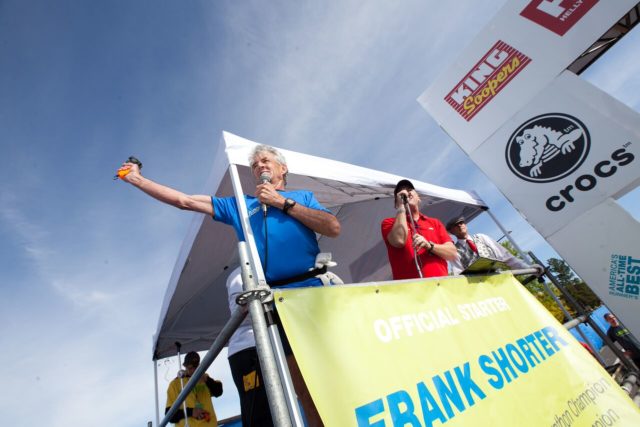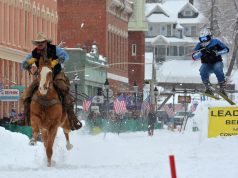
Most mornings, while many Boulderites are still wiping sleep from their eyes and brewing their coffee, Frank Shorter is already at Rally Sport, exercising on the elliptical and swimming laps. That might seem like enough daily fitness for the average person, but not for Shorter. In the early evenings he also hits the pavement around Wonderland Lake.
Rewind 44 years and his quick-moving feet were on a different track: the 1972 Munich Summer Olympics arena. The gold medal he claimed that year sparked the crazy idea that running could be a popular sport, or even a hobby.
“Millions of people discovered they love moving across the ground that way. Running for fun didn’t exist before. You ran for punishment,” Shorter says when I catch him during his afternoon downtime to escape the heat.
Now retired from the professional sport — but nowhere near done running — he has a little more time these days and has taken up motivational speaking. On July 19 he will be at the First Congregational Church in Boulder to sign and speak about his new memoir My Marathon. The book is a reflection on the aspects of Shorter’s life that led to his record-holding, pioneering athletic career.
While his first-place marathon win brought long-distance running to the forefront of the American fitness culture in the ’70s, that was hardly the beginning for Shorter. As early as middle school he felt a need to run.
“Training” back then consisted of running back and forth to school in New York City’s Upper West Side, something that molded his sprinting style to this day.
“I still run in a way that looks like I’m carrying my books in the crook of my left arm,” he says.
A sense of competitiveness also spurred in his youth — not with others but within himself. Shorter remembers a field day in sixth grade when he beat all the older kids but really only participated to find out how well he could do. The prize was a book about great American sports heroes, something he chuckles about now.Little did he know he would be considered one a few decades later.
The rest has gone down in athletic history. After the 1972 Olympics, he continued to win races around the world, including a silver medal in the Montreal games four years later. He won both the USA Cross Country Championship and the Fukuoka Marathon four consecutive years. He helped create the U.S. Anti-Doping Agency and served as chairman for three years. In 2007 he was inducted into the Colorado Running Hall of Fame, his third such recognition.
Although he may be the most distinguished and recognizable of American marathoners, he is quick to credit the subsequent cultural interest in the sport as a group effort, made possible with the support of guys like his Olympic team members Jack Bacheler and Kenny Moore.
“We all had this common goal of helping each other,” Shorter says. “It truly was an amateur sport.
“What’s great about the running boom is that it’s something that was built. It wasn’t that product of a public relations plan. It grew on its own and that’s the beauty of it. We’re just the caretakers for something that happened. No one is trying to get more out of it than anyone else.”
Shorter moved to Colorado when training for the ’72 Olympic games because he could receive all the benefits of altitude from the comfort of the indoor track at Balch Fieldhouse on University of Colorado’s campus. A man of many firsts, he’s used his success to enrich the local community.
He opened a specialty store that employed a handful of future star runners, and in 1979 he co-founded the annual Bolder Boulder, a race that now attracts more than 50,000 people.
Reflecting on the ever-growing running scene, Shorter says athletes come here for community support. He has noticed the population becoming more inclusive, something he attributes to the rise of altruistic events where “people are running for other people, other reasons, more than just themselves.”
But Shorter has always ran simply because he loves it. As he once replied to a friend’s mom who didn’t understand the appeal, “I like it. It does a lot of things for me.”
The clear-headedness that comes from running has also helped him cope with a rough and abusive childhood, something he reflects on heavily in his book, and also influenced his decision to write it.
“I hope young kids who are in bad situations see this and know this story and that they can create circumstances and situations to emerge from it,” Shorter says. “For whatever reason I was able to create that on my own. I had an instinct to deal with things by setting and achieving goals. … That way of thinking is a thread for all I did going forward.”
He credits his current mobility to being realistic about getting older and adjusting his training accordingly. Taking care of an aging body that has had multiple surgeries has allowed him to still run, albeit not against a stopwatch.
Nowadays, the 68-year-old is focused on “slowing down as slowly as possible.”
Off to sneak in a sprint before a thunderstorm rolls in, Shorter doesn’t seem to be slowing down at all.














